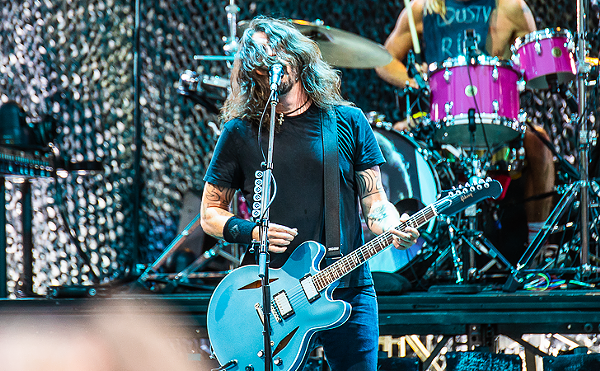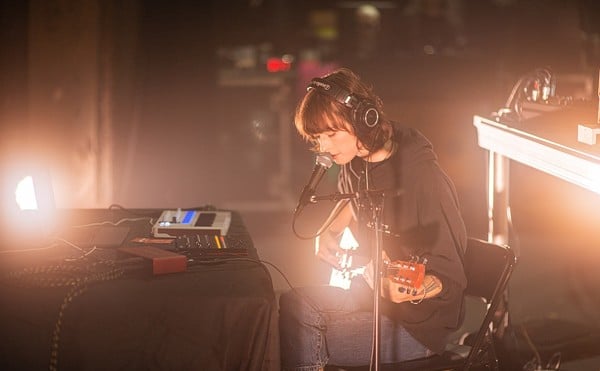T
hroughout the centuries, music has been both a tool of war and a remedy for the mental trauma and physical injuries sustained in battle. History teaches us that man’s love for music appears to be nearly as old as his need to engage in combat — both stretch back through time.
Conductor Leon Botstein once wrote in The New York Times that music can “effectively inspire patriotism and bravery.” Historian Kenneth A. Bernard called comic songs, ballads and patriotic numbers “better than rations or medicine” for soldiers in hospitals and camps in his book Lincoln and the Music of the Civil War.
And the tradition of music as anodyne continues in our time, visible during an improbably sunny and warm March morning in a treatment room at Cincinnati’s VA hospital, where four veterans sit around a large table in a nondescript therapy room. In addition to the usual detritus associated with medical treatment, the room is also cluttered with guitars and cases, tuners and other musical accouterments. The men are all 60- to 70-year-old Vietnam vets.
They’re here to take part in a program called Guitars for Vets (G4V), a nonprofit organization founded in 2007, explains Richard Hutchinson. Hutchinson, G4V’s national events and instrument donation coordinator and founder of the Cincinnati chapter, says the program operates more than 50 chapters in 25 states, providing guitar instruction aimed at American service veterans struggling with physical injuries, post traumatic Stress disorder (PTSD) and other emotional distress through a unique, supportive program.
According to the group’s website, many veterans “find hope in an unlikely place: behind the wood and strings of an acoustic guitar.”
And G4V shares the healing power of music by providing veterans with a new acoustic guitar, accessories and free guitar instruction.Hope is frequently elusive in the world of the American vet. Consider these facts from the G4V’s site: More than half of the 2.6 million veterans from the Iraq and Afghanistan wars struggle with physical and mental challenges, thousands of our war veterans are afflicted with PTSD, more soldiers have committed suicide since the Vietnam War than have died in actual battle and 22 veterans commit suicide every day.
These grim realities cause one to wonder — can music rescue brave men and women driven to states of fatal desperation? Can wood and catgut string save souls that are stretched to the point of breaking?
“Yes,” says Navy veteran Dave Schoenhoft.
Schoenhoft says that prior to completing the 10-week G4V course — and before having the opportunity to play out in public with other vets — he was stuck in a deep rut. He had racked up a criminal record and wrestled with substance abuse issues. G4V gave him a chance to get out of his head and beyond himself. “It gives you something else to think about,” he says, “a sense of pride and purpose.”
Schoenhoft says that G4Vets has allowed him the opportunity to get out of his head, live a better life and leave his past behind. “My recovery started here,” he says emphatically.Schoenhoft also credits the frequent concerts he now plays with G4V friends in helping him to overcome a deep distrust of others and a fear of being in public. He calls the G4V concerts “an amazing thing” and says that the program has positively affected every area of his life.
Gary Kruse, an Air Force veteran, agrees that G4Vets is a powerful program.
“If it weren’t for this program,” he says, “I wouldn’t be dead, but I certainly would be miserable.”Jimmy Walton, also an Air Force vet, says the biggest common denominator is that the group provides a safe meeting place where vets can be heard and understood. “It’s about camaraderie,” he says. “This program has enhanced my life and how I go through the day.”
Moreover, coordinator Hutchinson points out, G4Vets is far from a one-way street. Participants have played various events and venues in the area, often doing charitable work and often supported by professional musicians. Cincy Blues great Sonny Moorman, a major supporter of the program, is playing the upcoming Guitars For Vets PTSD Awareness Blues Bash concert at Bogart’s on June 18, joined by Jim McCarty, Noah Wotherspoon and Johnny Fink and the Intrusion.
“We’re giving a lot back,” Hutchinson says, “not just graduating students.”
Music as medicine and an act of charity is also evident in more traditional settings. Melanie Garner, a retired Christ Hospital employee, instituted musical concerts for patients at Christ some 20 years ago. From those concerts evolved a program in which four musicians, once a month, offer live music to many of the hospital’s long-term and/or repeat patients.
“It’s not formal musical therapy,” she says, “but a comfort measure… a labor of love.”
Locally based professional guitarist Richard Goering (who performs Classical, Jazz and a variety of other styles) has been playing the Christ gig since its inception. On some floors he’ll play in small common areas, where the staff will open patients’ doors so everyone can enjoy the music. On other floors, he’ll stroll from room to room, at times playing requests.
Some settings, Goering says, such as the oncology ward, are especially powerful for both the patient and the musician.
“For the patient,” Goering says, “it’s a more human kind of touch in a different situation; it’s someone reaching out in a difficult time.”
Renowned musician and neurosurgeon Dr. Oliver Sacks once wrote that he regarded music therapy “as a tool of great power… because of its unique capacity to organize or reorganize cerebral function when it has been damaged.”
Barbara Crowe, Director of Music Therapy at Arizona State University, posits that music not only possesses curative properties but that it can also “make the difference between withdrawal and awareness, between isolation and interaction, between chronic pain and comfort — between demoralization and dignity.”
Dick Buchholz, lead instructor with Cincinnati’s G4V chapter and a longtime local musician, agrees. For him, music is about communion, unity, and camaraderie.
“We are part of a team,” he says with a smile.Learn more about GUITARS FOR VETS and other local G4Vets events at guitars4vets.org.






